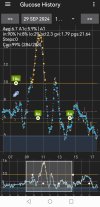When I cycle to work (15mile) I tend to go without food and usually also take 2-4 units to battle the fotf depending on how it's looking.
This usually works well. Food and adjustments then at work.
My main issue with commuting to work is trying to eat lunch (at work) early enough that I can do a proper bolus and not have too much left floating around for the ride home - it's not too bad for my usual ~1h commute, where I can snack before leaving to overcome any small amount of remaining IoB, but sometimes I ride to our other site which is getting on for 2h each way, which means I'll definitely need an uncovered snack before I leave and something else on the way. Not a major problem once you realise what you need to do though.
Interestingly the ride to the alternative site usually works quite well, even if I misjudge bolus I tend to be back where I want to be by the time I arrive (and I probably give slightly more bolus than I would for a longer ride because I know it's only 2h and I can stop and eat at the other end.)
But if going on a 50miler etc. I need the breakfast first.
I would prefer to eat first, but sometimes I just go and then start eating some of the food I've taken with me. For long rides (200km) I really do need to eat something before I leave unless I've got a stop planned with guaranteed food. These are the rides where I can go really high if I misjudge how much basal cover to do before I leave (doubtless also some pre-ride nerves as these are always self-planned and not previously ridden routes).
If I then do a correction after a couple of hours it only needs to be 1U to bring me crashing back down from the high teens/20s into single figures over the course of an hour or so (which is ok if a proper stop is coming fairly soon so I can start cramming in lots of food on my way to the stop to counter any low and then have a bit of a break from both riding and eating when I stop - otherwise it's unpleasant eating enough carbs to continue with an already full stomach.)
The last one I did in August actually wasn't too bad - I peaked in the low teens iirc. This was perhaps as I had a quick ride to the train station then sat on a train for an hour to get to my start point, so I was willing to give some extra bolus as I knew there would be less IoB by the time I was actually riding properly.
It's all a continuous experiment though!

I try and eat a couple of hours prior in order to get some level of stabilisation and trend prediction, but so far it usually always tends to go high during fotf. I
Rides that start mid-morning onwards are much easier to deal with!
never have the courage to take that little bit more insulin prior to a bike ride, even though I tend to carry way more carbs than I evere use.
Lol, same here, I both carry vast quantities of food and don't want to have to start eating it too early (and generally don't need to eat very much of it either, though on some occasions I have had to so was glad it was there).
What I'm finding on long rides is that if I don't start eating reasonably early in the ride I loose my appetite and don't really fancy anything when I need to start eating a bit later on (e.g if that is 4h into the ride), so I think perhaps erring on the side of a bit too much insulin so that I can actually start snacking around say 2h30 might work better even if I do end up needing to eat a bit more overall.
If I stop and get off the bike for say 45min for some food it's fine, my appetite will return, and I'll also get enough of a BG rise from the uncovered food to not need to eat for another ~1h30+ which takes some of the pressure off/acts as a reset for my stomach.
Agree, drink (night before and 2-3 to put me in a slight hangover state) can give a bonkers no insulin requirement next morning scenario!
But cycling through a hangover isn't all that much fun!


